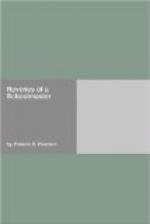This will necessitate a deal of research work, for I shall have to go back into history, first of all, to find out the course of study that produced Newton, Humboldt, Darwin, Shakespeare, Dante, Edison, Clara Barton, and the rest of them. If a roast-beef diet is responsible for Shakespeare, surely we ought to produce another Shakespeare, considering the excellence of the cattle we raise. I can easily discover the constituent elements of the beef pudding of which Samuel Johnson was so fond by writing to the old Cheshire Cheese in London. Of course, this plan of mine seems not to take into account the Lord’s work to any large extent. But that seems to be the way of us vocationalists. We seem to think we can do certain things in spite of what the Lord has or has not done.
The one danger that I foresee in all this work that I have planned is that it may produce overstimulation. Some one was telling me that the trees on the Embankment there in London are dying of arboreal insomnia. The light of the sun keeps them awake all day, and the electric lights keep them awake all night. So the poor things are dying from lack of sleep. Macbeth had some trouble of that sort, too, as I recall it. I’m going to hold on to the vocational stimulation unless I find it is producing pedagogical insomnia. Then I’ll resign from the band and take a long nap. I’ll continue to advocate pudding, pastry, and pie until I find that they are not producing the sort of men and women the world needs, and then I’ll beat an inglorious retreat and again espouse the cause of orthodox beefsteak.
CHAPTER XI
FREEDOM
I have often wondered what conjunction of the stars caused me to become a schoolmaster, if, indeed, the stars, lucky or otherwise, had anything to do with it. It may have been the salary that lured me, for thirty-five dollars a month bulks large on a boy’s horizon. Possibly the fact that in those days there was no anteroom to the teaching business may have been the deciding factor. One had but to exchange his hickory shirt for a white one, and the trick was done. There was not even a fence between the corn-field and the schoolhouse. I might just as easily have been a preacher but for the barrier in the shape of a theological seminary, or a hod-carrier but for the barrier of learning how. As it was, I could draw my pay for husking corn on Saturday night, and begin accumulating salary as a schoolmaster on Monday. The plan was simplicity itself, and that may account for my choice of a vocation.
I have sometimes tried to imagine myself a preacher, but with poor success. The sermon would bother me no little, to make no mention of the other functions. I think I never could get through with a marriage ceremony, and at a christening I’d be on nettles all the while, fearing the baby would cry and thus disturb the solemnity of the occasion and of the preacher. I’d want to take the baby into my own arms and have a romp with him—and so would forget about the baptizing. In casting about for a possible text for this impossible preacher, I have found only one that I think I might do something with. Hence, my preaching would endure but a single week, and even at that we’d have to have a song service on Sunday evening in lieu of a sermon.




